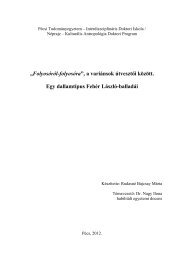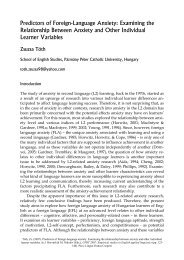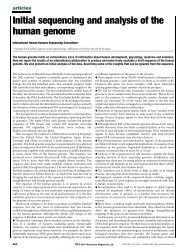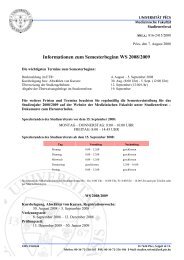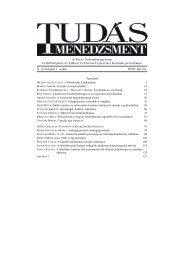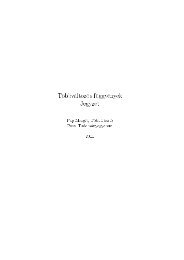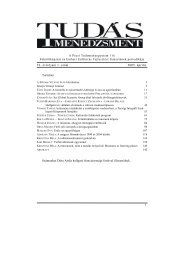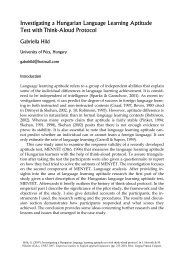2006. évi 1. szám - Jura - Pécsi Tudományegyetem
2006. évi 1. szám - Jura - Pécsi Tudományegyetem
2006. évi 1. szám - Jura - Pécsi Tudományegyetem
Create successful ePaper yourself
Turn your PDF publications into a flip-book with our unique Google optimized e-Paper software.
Irimie Emil Popa–Adrian Inceu: Law and accounting interference<br />
Ph.D. Irimie Emil Popa<br />
Lecturer professor<br />
Ph.D. Adrian Inceu<br />
Lecturer professor<br />
“Babes-Bolyai” ¸ University Cluj-Napoca, Rumania<br />
Law and accounting<br />
interference<br />
The patrimony represents a specific category of any law<br />
subject. Each law subject is compelled to hold the bookkeeping<br />
of their own patrimony, and of the transactions<br />
and the financial operations that they have contracted.<br />
We can no longer have doubts upon the relationship<br />
established between Law and accounting,<br />
because in present, we cannot speak of accounting<br />
without taking into consideration law. We can<br />
therefore present various arguments to express this<br />
relationship. Without having any interest in creating<br />
further disagreements between the two fields taken<br />
under consideration, we assert that the interdependence<br />
between law and accounting has the purpose<br />
of clarifying common aspects of their application.<br />
We shall focus on some of the most important<br />
and solid arguments that bring together law and<br />
accounting.<br />
From a classical point of view, we can define the<br />
object study of accounting as being the patrimony of<br />
the entity, which is in fact the cumulating of the rights<br />
and obligations of a patrimony titular. Accounting<br />
as a process highlights and studies the relationships<br />
between the patrimony titulars and the other law<br />
subjects.<br />
In fact, the fundamental equality assets = liabilities<br />
was born out of the necessity of depicting and<br />
quantifying some exchange judicial reports.<br />
Accountancy does not reflect only the “tangible<br />
reality” having either a material and/or an immaterial<br />
form but it also concerns judiciary abstrac tiveness.<br />
In present some experts sustain the substance<br />
over form principle. According to this point of view<br />
the most important thing is not the property records<br />
regarding the property of assets, but the property<br />
of the assets of bringing future economical benefits.<br />
This is a pragmatic approach, of Anglo-Saxon<br />
origin, present in the International Accounting Standards<br />
as well. All this ended up in substituting the<br />
patrimony with the financial position of the entity.<br />
If from an economical point of view we can abdicate<br />
the concept of patrimony, from a juridical point<br />
of view this is impossible. But accounting and law<br />
are not irreconcilable form this point of view.<br />
141<br />
If the concept of patrimony suffers no change<br />
from an economical point of view, we shall have a<br />
serious theme for debating in the near future.<br />
Firstly, the elaboration of a theory of outside balance<br />
sheet engagements will allow changes in the<br />
traditional approach (patrimonial approach) of both<br />
Law and Accounting allowing an improvement in<br />
their economical and financial sides.<br />
Secondly, accounting is strongly normalised<br />
and regulated by specific laws in a large number of<br />
European countries. In a lot of cases we encounter<br />
detailed regulations regarding the accounting technique.<br />
Accounting regulations are subject to different<br />
juridical frameworks, specific to each and every<br />
country. Inevitably there are multiple interferences<br />
between accounting and law.<br />
The entity is the field where the fiscal law, the<br />
company law and the commercial law interfere, both<br />
among themselves and with accounting as well.<br />
For instance the establishment of the quantum of<br />
taxes makes object of special laws and/or regulations<br />
all over the world. Accountancy interferes more or<br />
less with the laws and regulations that we have mentioned<br />
above, depending on the connectivity degree<br />
of accountancy-fiscal laws. More and more experts<br />
agree to the conclusions that a total accounting-fiscal<br />
regulation discount is impossible to be accomplished.<br />
Thirdly, if we consider accountancy from a<br />
conceptual point of view, as a science belonging to<br />
the group of social-administration sciences, we can<br />
observe that at an entity level there exists an interference<br />
with the juridical side in what the technical<br />
problems are concerned. Accounting is the resultant<br />
of the junction between administration and law.<br />
The fundamental objective of accounting is to<br />
offer useful information to those showing interest,<br />
thus respecting the truthfulness of information, the<br />
legal regulations and the true and fair view principle.<br />
Therefore the proper information given to the<br />
users of accounting information can be realized only<br />
by respecting the true and fair view principle. The<br />
true and fair view is understood in many accounting<br />
systems as respecting the professional and/or<br />
legal regulations. We also mention that presenting<br />
deliberately erroneous information of the financial<br />
statements draws penal responsibility upon those<br />
who are responsible in most of the European Union<br />
Countries.<br />
Another argument for our research is that accounting<br />
information supplied constitutes a juridical<br />
proof in the juridical process both in criminal law<br />
and in civil law. Therefore, accounting offers written<br />
proof that can be used in the judicial accounting<br />
expertise.<br />
Last but not least, we can assert that the juridical<br />
JURA 2006/<strong>1.</strong>



